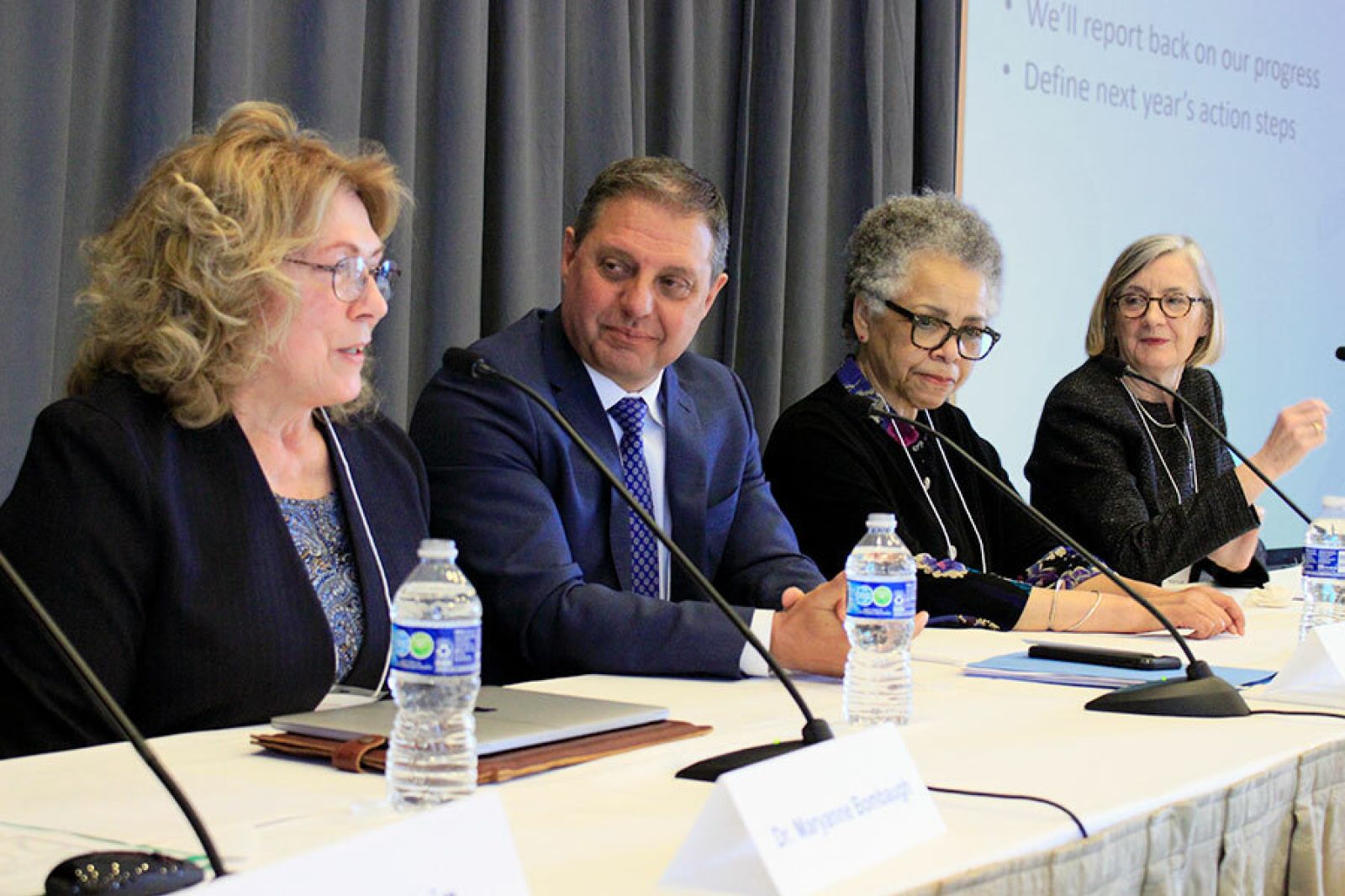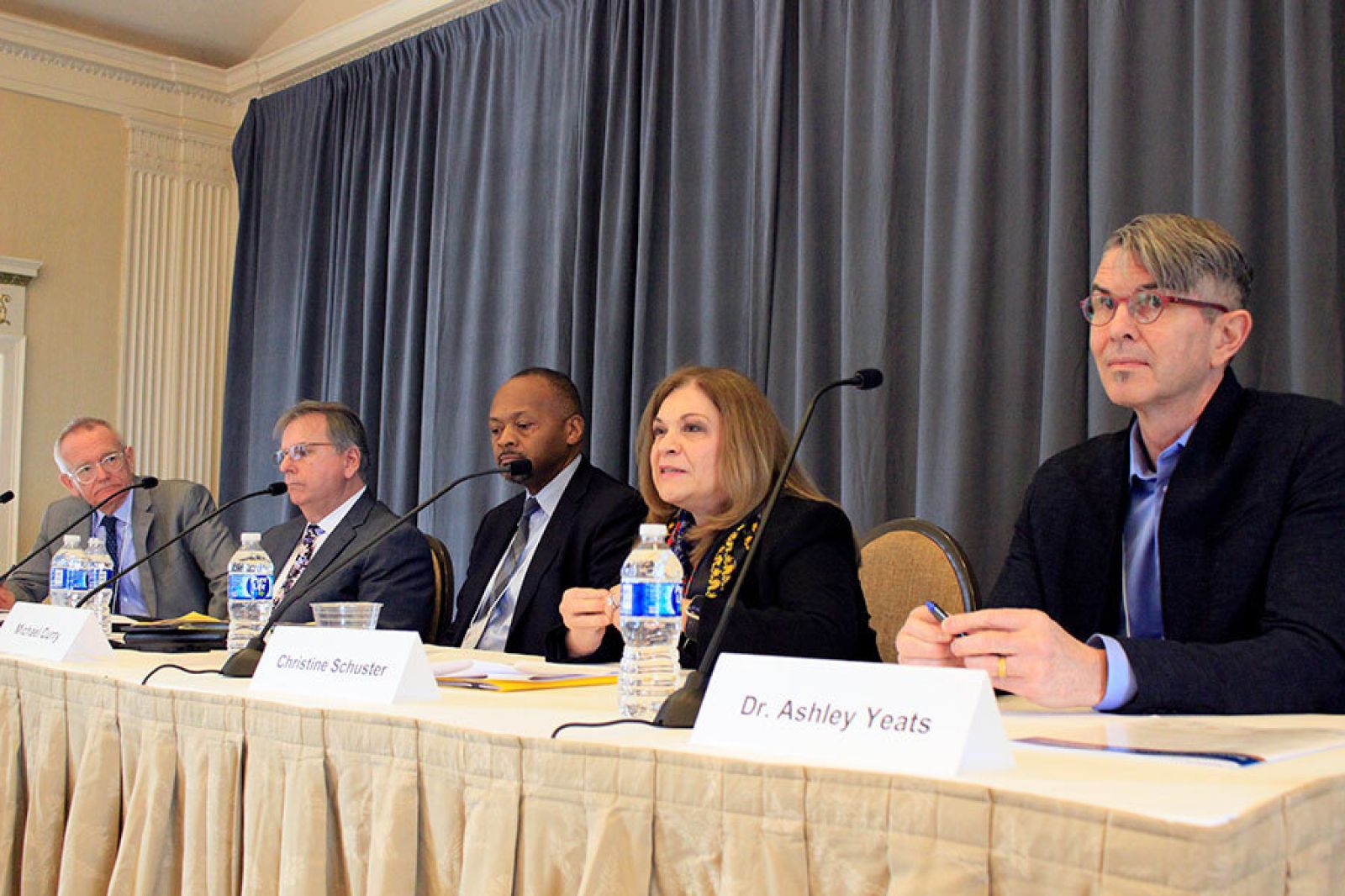Broad support for new Roadmap to Health Care Safety voiced at MA Health Policy Forum

Presenter panel, from left to right: Maryanne Bombaugh, Dani Hackner, Deborah Washington, Patricia Folcarelli
Signaling a new era for health care delivery in the state, the Roadmap to Health Care Safety for Massachusetts was released April 26 at the Massachusetts Health Policy Forum. Leaders from health care organizations, patient advocates and policymakers were among the nearly 200 people who attended the public forum in Boston.
In opening remarks, Dr. Kiame Mahaniah, newly appointed Undersecretary for Health for the Massachusetts Executive Office of Health and Human Services, highlighted the urgency of the work, saying he and the Healey administration look forward to collaborating in the effort to make health care in Massachusetts as safe as it can be.
"The only way to truly have a system that is safe for patients," he added, "is to make patient safety a priority."
As a practicing physician and recent CEO of the Lynn Community Health Center, Dr. Mahaniah said that while there is no quick fix for patient safety challenges, “The Roadmap
offers a sustained, phased approach for moving together as a state.”
The Roadmap is a strategic plan organized around five goals to propel investment, action and transformative change for safety across all care settings in the Commonwealth. The goals address leadership and culture, operations and engagement, patient and family support, workforce well-being, and measurement and transparency.
At the Forum, hosted by the Heller School of Public Policy and Management at Brandeis University, a panel of presenters outlined the Roadmap’s purpose and goals and emphasized that the recommended approaches to safety improvement will also help provider organizations address other key priorities, including workforce retention, equity, patient experience and operational efficiencies.
Presenter Dr. Maryanne Bombaugh, Past President of the Massachusetts Medical Society, underscored the need to build strong cultures of safety within provider organizations and practices. “Safety culture is set by leadership at every level of an organization and practice,” she said. “Leaders need to set a vision for safety and make it a core value.”

Leadership panel from left to right: Troyen Brennan, Ted Calianos, Michael Curry, Christine Schuster, Ashley Yeats
Dr. Dani Hackner, Physician-in-Chief for Medicine at Southcoast Health, spoke about leaders who inspired him, starting with this father who was also a physician. He underscored leaders' role in building safety culture and ensuring that there is meaningful engagement of clinicians, staff, patients and families, in safety improvement work.
Deborah Washington, DEI Health and Community Partnerships Manager at Massachusetts General Hospital, spoke about the Roadmap's goals addressing workforce well-being and patient and family support. She stressed the need for greater partnerships with patients in health care and to addressing inequities in safety outcomes for people of color.
Patricia Folcarelli, Vice President of Patient Safety at CRICO, shared the Roadmap's strategies for stronger safety measurement and transparency. She noted that good safety measures can be meaningful drivers of improvement work.
The event also featured a panel of four local health care leaders who discussed the ways in which the Roadmap will guide efforts to improve safety for patients and the workforce across the continuum of care. Dr. Troyen A. Brennan, Adjunct Professor at the Harvard T.H. Chan School of Public Health moderated the panel.
“This Roadmap is exactly what we need to move forward,” said Christine Schuster, Board Chair of the Massachusetts Health and Hospital Association. “Count us in.”
Schuster, who is President and CEO of Emerson Health, and others at the Forum said that health care organizations can now build on structures put in place to keep pace with rapid changes during the pandemic, particularly increased attention to teamwork and frequent communication.
“We need to start with innovation where it’s occurring. It’s not all going to work, but we can’t stick with the status quo,” said Dr. Ashley Yeats, Vice President of Medical Operations at Blue Cross Blue Shield of Massachusetts.
Michael Curry, President and CEO of the Massachusetts League of Community Health Centers, said he is pleased to see health equity concerns reflected in the Roadmap. “I’m excited that some of this work that has been keeping health center leaders across the state awake at night for many years is now a broader conversation around how we can address these challenges,” said Curry.
I’m excited that some of this work that has been keeping health center leaders across the state awake at night for many years is now a broader conversation around how we can address these challenges.
He added that some community health center practices, especially the extensive inclusion of patients and families in their governance structures, could serve as models for safety improvement work in other health care settings.
Dr. Ted Calianos, President of the Massachusetts Medical Society, stressed the importance of boosting health care safety through “the entire vertical of health care.” Referencing safety, value and accountability, Dr. Calianos said, “Everyone has to feel that they are empowered to participate.”
Philip W. Johnston, Chairman, and Michael Doonan, Executive Director, of the Massachusetts Health Policy Forum highlighted their organization’s commitment to continue the conversation about health care safety.
“The work you have done over the past three years is critical and groundbreaking for Massachusetts and the nation, too,” said Doonan in closing remarks, “and we’re going to continue to engage with it.”
Work has already begun on several of the Roadmap’s first set of actions, which include technical assistance and support on patient and workforce safety for small office practices, increased activation of Patient and Family Advisory Councils and a voluntary pilot program of automated surveillance of electronic health records to help hospitals anticipate and catch adverse events before patients are harmed.
New evidence of patient harm led to the public-private partnership
The work you have done over the past three years is critical and groundbreaking for Massachusetts and the nation, too, and we’re going to continue to engage with it.
Research from the Betsy Lehman Center spurred collaboration that led to development of the Roadmap. Despite gains in safety outcomes over the last 25 years, the Center’s research found a conservative estimate of nearly 62,000 incidents of harm and more than $617 million of excess cost in Massachusetts in 2017 due to preventable medical error. It also revealed that many people who report having experienced medical error suffer long-lasting behavioral, physical, emotional and financial harms.
Given those findings, the Betsy Lehman Center proposed to develop a coordinated response through which the Commonwealth’s providers, policymakers and public could accelerate safety and quality improvement and provide an example for other states to follow.
Following through on that proposal, the Betsy Lehman Center convened the Massachusetts Healthcare Safety and Quality Consortium in December 2019. The Consortium is a public-private partnership of 36 organizations representing stakeholders across all disciplines and settings of care.
The Consortium formed task forces to develop programmatic and policy recommendations for achieving its goals. More than 115 individuals, most of whom work on the front lines of health care in the Commonwealth, served on the task forces during a particularly challenging time and produced the detailed Roadmap released at the Forum.
Watch videos from event on YouTube